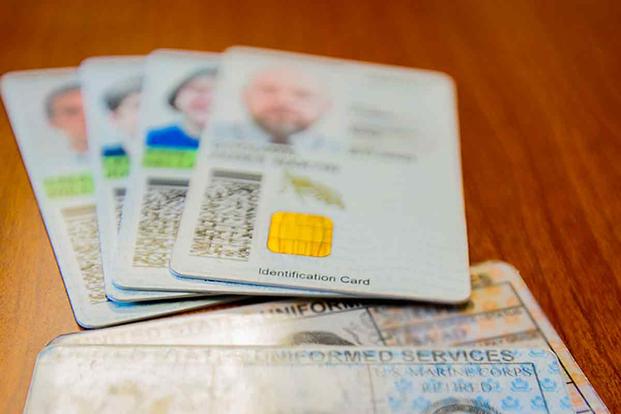Military retirees and some spouses or dependents whose next-generation Department of Defense identification cards have an "INDEF" expiration date continue to face problems using their IDs to traverse Transportation Security Administration checkpoints at U.S. airports.
And a potential solution under consideration at TSA -- that the agency drops the IDs, known as USIDs, as acceptable forms of identification when stricter travel requirements are implemented next year -- is sure to irritate those who like using their military IDs instead of a state driver's license or passport for travel.
Nearly a dozen military retirees have contacted Military.com in the past two years with concerns that their ID cards marked INDEF, meaning they have an indefinite expiration date, don't work with TSA screening technology in airports across the country.
Read Next: Pentagon's Second Review of Abbey Gate Attack Finds Troops Didn't See Bomber Before the Explosion
Former service members have run into the issue at Chicago O'Hare International, Seattle-Tacoma International, Orlando International, Tampa International, San Diego International and elsewhere.
According to TSA press secretary R. Carter Langston, the problem centers around USIDs that lack an expiration date. The "INDEF" designation cannot be read by the TSA's Credential Authentication Technology. When the CAT unit does not detect an expiration date, the CAT screen will display an "EXPIRED" alert, according to Langston.
The TSA officer is supposed to ask for another acceptable form of ID that can be read by the CAT unit, Langston said. If the passenger does not have another acceptable form of ID, the officer "will conduct manual inspection of the DoD ID presented as these IDs are currently acceptable forms of ID," Langston said in a statement.
The issue is largely a matter of inconvenience, since many people travel with a driver's license, passport or other form of identification.
But for DoD ID card holders, it could become a major problem beginning May 7, 2025, when all travelers and visitors to the U.S. will be required to have a passport, a state-verified REAL ID or another form of identification designated as acceptable by TSA.
Since the REAL ID Act of 2005 was passed, Defense Department IDs holders have been told their IDs are compliant and acceptable in lieu of a REAL ID and many have not bothered to get a REAL ID compatible state identification card.
They may need to or begin traveling with a passport, because given the ongoing issues, TSA is considering dropping DoD IDs from their list of accepted identification before the REAL ID requirement goes into effect, according to a source with knowledge of ongoing discussions between TSA and the Defense Department.
The Defense Department did not respond to a request for comment on the proposal, and Langston said he would not "confirm or deny discussions that are pre-decisional in nature."
But the proposal does not sit well among some former service members who spent decades serving their country and take pride in carrying a military ID.
"You can get on any military base in the country, but you can't get on an airplane with a military ID card? I don't agree with that at all," said a military retiree based in Washington state who requested that his name not be used to protect how he learned of the proposal.
The source added that the decision is not final and discussions were ongoing.
The Defense Department updated the new IDs, known as USID, for active-duty family members, military retirees and their dependents, reservists and Medal of Honor recipients in 2020, the first upgrade to the cards since 1993.
The USID cards look similar to Common Access Cards, which are issued to active-duty personnel, but they don't have a built-in chip. They were created to have durable lamination, full-color photos and enhanced security features to make them less able to counterfeit or misuse.
When the USIDs were introduced, TSA's scanning system was unable to read their barcodes. That issue largely was fixed in 2022 with a software update, and DoD ID cards work for most individuals whose cards have an expiration date.
But the problem continues for IDs with the "INDEF" date. And retirees aren't happy about it.
"It's been my assumption all along [that I could fly with a DoD ID card]," said the Washington-based retired officer. "I had an old ID until just a couple of months ago, and it worked just fine."
Related: Defense Department Expands ID Card Renewals by Mail to US-Based Retirees, Dependents













